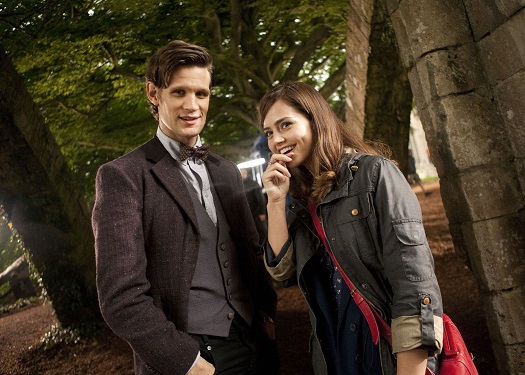 |
| The Twelfth Doctor (Peter Capaldi) and Clara Oswald (Jenna Coleman) |
Steven Moffat’s run on Doctor Who has been controversial, to say the least. He started well, and had ambitions to recreate the kind of year-spanning story arcs untried since Graham Williams helmed the show in the late 1970s. But his love of long, rambling plotlines, his tendency to push stories lacking narrative tension into production, and is love of exaggerated, rococo scene design, have alienated many fans. And don’t get some started discussing Amy Pond.
For me, however, the culmination of my frustration came when Moffat concluded Clara Oswald’s two-story arc in 2015. Not counting her one-off appearance in as a slightly different character in 2012, Clara debuted at the beginning of 2013, and left at the end of 2015. During that time, we had the first cringe-inducing moment in the episode “The Name of the Doctor,” when she said frankly, “I was born to save the Doctor.”
Two years later, in “Face the Raven,” we had the surprising sight of Clara dying to save the Doctor. Other than mayfly companions like Astrid Peth, we hadn’t seen one of the Doctor’s credited companions die on-screen since Adric in 1982, thirty-three years earlier. Longtime fans weren’t prepared to have the Doctor’s friend die violently, even in a self-sacrificing way, and were surprised when, two episodes later, even the Doctor’s work-around couldn’t save her.
So Moffat literally put a woman onscreen who was born to save the Doctor, and who died to save the Doctor. Maybe Moffat thought it was time for someone else to save the Doctor, who has saved so many others; most of the Doctor’s regenerations have been self-abnegating acts of heroism, including the Fifth, Ninth, and Tenth Doctors, who all specifically died protecting their companions’ lives. Maybe Moffat decided somebody else ought to bring salvation to this unusually messianic character.
Or maybe it was just sloppy.
Early depictions emphasized the romantic tension between Clara and the Doctor. In “Hide,” the psychic Emma Grayling specifically warns Clara not to fall in love with the Doctor, claiming there’s coldness at his heart. (This theme runs throughout the Eleventh Doctor’s run, that he’s secretly plagued with rage stemming from unchecked guilt.) The warning doesn’t take, however. By “The Time of the Doctor,” Matt Smith’s regeneration episode, Clara accidentally lets slip that she follows the Doctor because “I fancy him.”
 |
| The Eleventh Doctor (Matt Smith) and Clara Oswald (then billed as Jenna-Louise Coleman) |
Even if it’s true, that’s a weak, weak reason. Rose Tyler, the Doctor’s first companion following the show’s resurrection in 2005, also professed her love and attraction for the Doctor, sure. But in “The Parting of Ways,” the Ninth Doctor’s regeneration episode, she says she sticks with him because “He showed me a better way.” Rose’s attraction to him wasn’t only personal; the Doctor also taught her to be a better human being.
Clara shows some inclinations to self-improvement through her run. After the Doctor’s regeneration frustrates her romantic aspirations, she channels those feelings onto Danny Pink, and by learning to love and trust another human, she turns his struggles with wartime PTSD into actions that save humanity. She even learns to stand up to the Doctor, as seen in “Dark Water.” But romantic love remains her chief motivator throughout.
One never gets the feeling, watching Clara, that she’s exceeded the circumstances of her origin. She constantly exists to prod the Doctor, to keep him on the straight path and keep him moving forward when he’d rather descend into self-pity. She literally does so in “The Snowmen,” when it’s revealed he’s been wallowing since losing Amy Pond. Clara literally chases the Doctor onto his cloud, into his TARDIS, and encourages him to act.
Again, in “The Bells of St. John,” the first time Clara appears as Clara, her phone call rousts the Doctor from stewing in a medieval monastary. Lacking either the Fourth Doctor’s restlessness or the Tenth Doctor’s wrath, the Eleventh Doctor would rather sit around, taking up space, than do anything, unless Clara motivates him. No wonder, in “Flatline,” Clara undertakes the active role usually performed by the Doctor. Without her, he’s become moribund and immobile.
So when it transpires that she was born to save the Doctor, and dies to save the Doctor, I’m forced to wonder: why do we waste time with the Doctor? Despite his knowledge, age, and technical prowess, he’s become a passive passenger in his own series. Clara is doing things. Clara motivates the show; the Doctor is Clara’s companion now. Then Moffat kills her. And now, I have trouble watching my one-time favorite show.
No comments:
Post a Comment